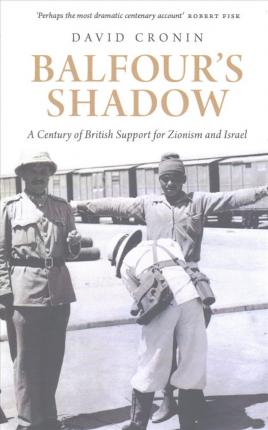Balfour’s Shadow – A Century of British Support for Zionism and Israel
A review of the book authored by David Cronin

The Balfour Declaration, currently accepted by many as the founding legal statement for the establishment of Israel is really nothing more than a letter. It was a letter of policy between government personnel and became a major part of foreign policy then, and its shadow effects have continued on rather effectively to now. Balfour’s Shadow is a well written outline of the history of events after the letter: the immediate short term effects on British policy after WW I; the medium range policies that continued until after WW II; up to Britain’s current policy of advocating for and dealing with Israel. It is not a pretty story.
The letter was not necessarily well intended. Balfour himself was anti-Semitic. Yet the letter offered support to the Zionists for the creation of a Jewish national home in Palestine. Several factors accounted for this, one of them being this very anti-Semitism, as many British felt that Jews would never assimilate into their society.
Several other factors came into play: Jewish support in the war effort was considered necessary; the British wanted to protect the Suez Canal as the main route through to its then colonies of south Asia, mainly India; and natural resources, oil, became a major interest after oil was discovered in abundance in the Middle East. A colonial outpost would, Britain believed, help consolidate control of the region against Arab interests in an era when British racism ran rampant throughout its colonial networks.
From that beginning, Cronin highlights the major factors in the relationship between Zionists, Jews, and the British government. He deals specifically with events pertaining to the government, and does not detail all that transpired during Britain’s occupation via the Palestinian Mandate. But the general thread of the history is exposed throughout the work, accessible to both those with a strong background in the history and those just entering into the discovery process of Middle East history. For the latter, Balfour’s Shadow provides enough detail that a reader should be motivated to research more information through other works (of which there are many).

Author David Cronin (Source: @dvcronin / Twitter)
In general, Cronin reveals that the methods used by the British to control the indigenous population of Palestine laid the foundation for the ethnic cleansing and later suppression of the Palestinian people. Much history has been written about the Haganah, Stern, and Irgun ‘gangs’ fighting against the British, but the general trend of British behaviour was to support the increasing settlement patterns, evictions, and land grabs of the Zionist settlers.
After the nakba, Britain continued to supply Israel with military support ranging from hundreds of tanks, many planes, up to and including nuclear systems, in particular the sale of heavy water through Norway. This period was a transition from British global power to U.S. global power: after the fake war for the Suez Canal and the later pre-emptive war of 1967, the U.S. had clearly taken the lead in supporting Israel. Britain however did not let go.
Indeed, Britain became one of the strongest voices in support of Israel as military trade and financial/corporate interests continued with mostly behind the scenes activities. Additional information is provided showing how the British worked to sideline the PLO by effectively recruiting Arafat as leader of a recognized PLO ‘government’, leading to the false promises of the Oslo accords and the continued annexation, settlement, and dispossession of the Palestinians.
For contemporary events, Cronin highlights the bizarre career of Tony Blair. At this point in time Blair was truly a “loyal lieutenant” for the U.S., adopting and promulgating U.S. policy for Israel and the Middle East in general. Bringing the work up to current events, “Partners in Crime” outlines the corporate-military ties between Britain, Israel, and the U.S.. Most of the corporate interest is military procurement going both directions – hardware to Israel, spyware and security ware to Britain. As always, these corporations (Ferranti, Affinity, Elbit, Rafael, Rokar, Lockheed-Martin) changed British views – at least of the elites – from tentative support to solidarity. These friendly relations also helped tie Israel into the EU more strongly.
Today, official British policy remains as an ardent supporter of Israel, with a lasting pride in Israel’s founding. The British colonial heritage rages on in the Middle East.
This is an excellent work most specifically for its focus on British attitudes concerning the development of Zionism/Israel, a history of war crimes and apartheid. Kudos to Cronin for his extensive use of many personal diaries and notices and of official records from War and Colonial office files as well as Foreign and Commonwealth files for more recent materials. It is concise and direct, an accessible read that can serve as a prerequisite for Middle East studies/Zionist studies and as a general guide to British policy for Israel. [1]
***

Title: Balfour’s Shadow – A Century of British Support for Zionism and Israel
Author: David Cronin
Publisher: Pluto Press, London
Notes
[1] Many books cover the development of Zionism and the creation of Israel. For a more highly detailed development of the historical situation preceding and leading up to the Balfour letter itself, the best I have read is: The Balfour Declaration – The Origins of the Arab-Israeli Conflict. Jonathan Schneer. Anchor (Random House), Canada. 2012.
This review was first published in Palestine Chronicle, June 29, 2017.
Featured image from Book Depository

